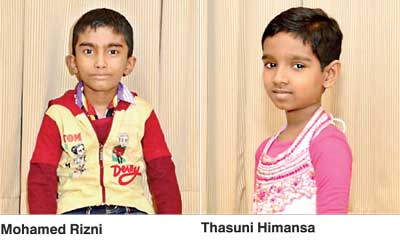Tuesday Feb 24, 2026
Tuesday Feb 24, 2026
Friday, 19 June 2015 00:00 - - {{hitsCtrl.values.hits}}
A year since they underwent Bone Marrow Transplant at Asiri Group’s Central Hospital, Mohamed Rizni of Weerapokuna and Thasuni Himansa of Nikaweratiya, Kurunegala are getti

ng themselves their booklists and uniforms as they prepare to resume their schooling. Both, Mohamed and Himansa were treated at Central Hospital a year ago and discharged with a priceless gift; that of hope and a future of blood transfusion free life.
“Both seven year old Mohamed Rizni and eight year old Himansa were diagnosed with Thalasseamia at an early age,” said Consultant Haematologist Dr. Lallindra Gooneratne who has been treating and watching over the patients together with Consultant Paediatrician Dr. Ruwangi Dissanayake, for the last 12 months. “Mohamed was diagnosed with the disease when he was just five months of age and has had over 70 blood transfusions since then,” Dr. Gooneratne went on to note.
Having faced the most harrowing years of their lives, Mohamed and Himansa, along with five other patients, treated at Central Hospital, now face their future with renewed vigour and hope that they can lead a normal life.
Central Hospital opened their Bone Marrow Transplant Unit in June 2014 and has been in the forefront of performing the procedure on children diagnosed with Thalassaemia. The first four procedures were performed free of charg e. They are now equipped to take in patients with blood related malignancies such as Multiple Myeloma etc. The BMT procedure involves 1 ½ months in hospital and a 6 to 12 month monitored convalescent period, after discharge. Dr. Gooneratne explained that monitoring with blood tests and careful dose adjustments of drugs is vital to maintain immunity and prevent the onset of graft cells attacking the host organs such as the liver.
e. They are now equipped to take in patients with blood related malignancies such as Multiple Myeloma etc. The BMT procedure involves 1 ½ months in hospital and a 6 to 12 month monitored convalescent period, after discharge. Dr. Gooneratne explained that monitoring with blood tests and careful dose adjustments of drugs is vital to maintain immunity and prevent the onset of graft cells attacking the host organs such as the liver.
Asiri Group of Hospitals Chief Executive Dr. Manjula Karunaratne commenting on the unit said that while the BMT centre is geared to carry out Allogeneic transplants, the combination of the state-of-the-art facility plus a dedicated nursing staff, contribute to the success of the treatment, which in most instances is a definitive lifetime cure.
“The first weeks after a marrow transplant are a time of especially high risk. The patient is cared for in absolute sterile conditions until the donated cells start to grow and make new blood cells and kept isolated, to prevent onset of infection. The nursing staff too undergoes the same isolation and are confined to the unit for the duration of the treatment,” explained Dr. Karunaratne.